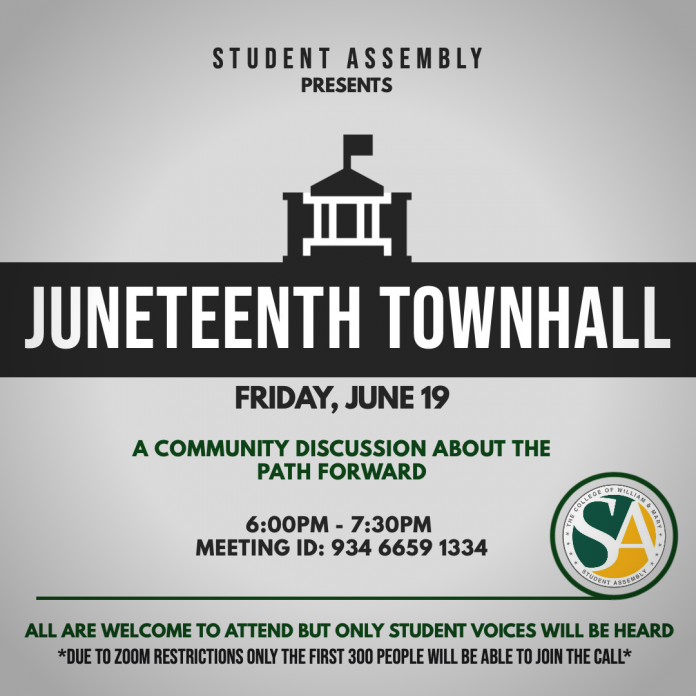Friday, June 19, the College of William and Mary Student Assembly hosted a Juneteenth town hall over Zoom in commemoration of the emancipation of enslaved people in the United States. Students, administrators and SA representatives gathered together for the meeting, which highlighted the voices of Black students on campus and the ongoing struggles those students face.
SA President Anthony Joseph ’21 started the town hall by discussing the history of Juneteenth and its implications for Black Americans.
“Choosing this day was no coincidence,” Joseph said. “What is often overlooked in our history books is the second independence day and freedom from tyranny that occurred in this nation on Juneteenth. June 19, 1865, was the day those Texans were freed, officially marking the end of the great terror of slavery. However, while many freed slaves believed that they would finally receive their inheritance of life, liberty and pursuit of happiness, Jim Crow took that from them, and mass incarceration took it from their descendants.”
Following a directive from College President Katherine Rowe, the university closed administrative offices on Juneteenth to commemorate the holiday.
Joseph then emphasized the importance of open discussion to create a safe campus community for Black students at the College.
“Having this today reminds us of the work we must do to ensure those principles for Black and Indigenous people and other marginalized communities.”
“Having this today reminds us of the work we must do to ensure those principles for Black and Indigenous people and other marginalized communities,” Joseph said. “None of us are free until we are all free. This town hall is the start of fulfilling the promises of Juneteenth for Black people and marginalized communities. The conversation must start now.”
SA Chief of Staff Loni Wright ’21, who also serves as co-president of the Black Student Organization, echoed Joseph’s sentiments by emphasizing that although race is currently in the media spotlight, it has always been an issue at the College.
“While this may have been spurred on by the Black Lives Matter movement, disproportionate police brutality is merely the beginning of the issue,” Wright said. “William and Mary has a long history of systemic oppression, from the way it was built, with the hundreds of enslaved people, to the current micro and macro aggressions a lot of Black students on this campus experience today. It’s embedded in the very structure of our university.”
The event highlighted several members of the College community, from undergraduates to law students to alumni, who spoke about their experiences as Black students on campus.
Amber Bowman ’21, president of Alpha Kappa Alpha, one of the Divine Nine historically Black sororities, spoke about how the College claims to promote diversity yet places the burden of maintaining diversity onto the students.
“William and Mary has often promoted itself on diversity and having diverse clubs and diverse happenings, and as a tour guide, I know that we often boast about our 500+ clubs, offering a wide variety of things,” Bowman said. “But the thing is, it’s not William and Mary that’s starting those clubs, it’s us, it’s the students, it’s the changemakers.”
Bowman also said she often sees little support from the College administration at Black cultural events.
“When we have iREP every year from ACS [African Culture Society], when we have Stompfest every year from BSO [Black Student Organization], and the only people from the administration and professors that we see are the ones that it would make sense to see, like the professors in Africana Studies or professors that are Black otherwise, that’s saddening for me, for an institution that boasts so much about diversity and diverse happenings,” Bowman said.
“When we have iREP every year from ACS, when we have Stompfest every year from BSO, and the only people from the administration and professors that we see are the ones that it would make sense to see, like the professors in Africana Studies or professors that are Black otherwise, that’s saddening for me, for an institution that boasts so much about diversity and diverse happenings.”
Other students spoke about their experiences on campus, from racially charged posters in academic buildings to poor treatment from alumni and professors. Many students shared a common sentiment: the College’s administration is not doing enough to support Black students.
Bowman specifically cited College President Katherine Rowe’s campus-wide email response to the May 25 murder of George Floyd as an instance where the College failed to address the needs of students of color.
“Often when these emails are sent, they’re phrased in a way that is meant to pacify those that are not POC [People of Color], and make them feel comfortable,” Bowman said. “But I feel as though we also deserve to feel comfortable, and we are the people on campus that oftentimes are uncomfortable.”
Bowman underscored that these issues are not new; they have been happening for a long time.
“When we get these emails from President Rowe, when my friends in sports get these emails from their directors, it’s getting really old,” Bowman said. “When we have to continue to ask and ask and ask for a different response, that gets old. When we have to look at articles going viral about how many of the arrests made in Williamsburg are of Black men, that’s getting old. We can see that these things are intentional. We see all of this, but we don’t see the action, we don’t see the care, and we need that.”
Overall, student speakers emphasized that the College can often make Black students feel tokenized, marginalized and uncomfortable.
“When I give tours, parents often ask me about the safety of the campus, and I usually respond that it is really safe, but it depends on what kind of safety you’re talking about,” Bowman said. “Is it emotional safety, or is it just physical safety? Because both are questionable for Black members in the community and on our campus.”

